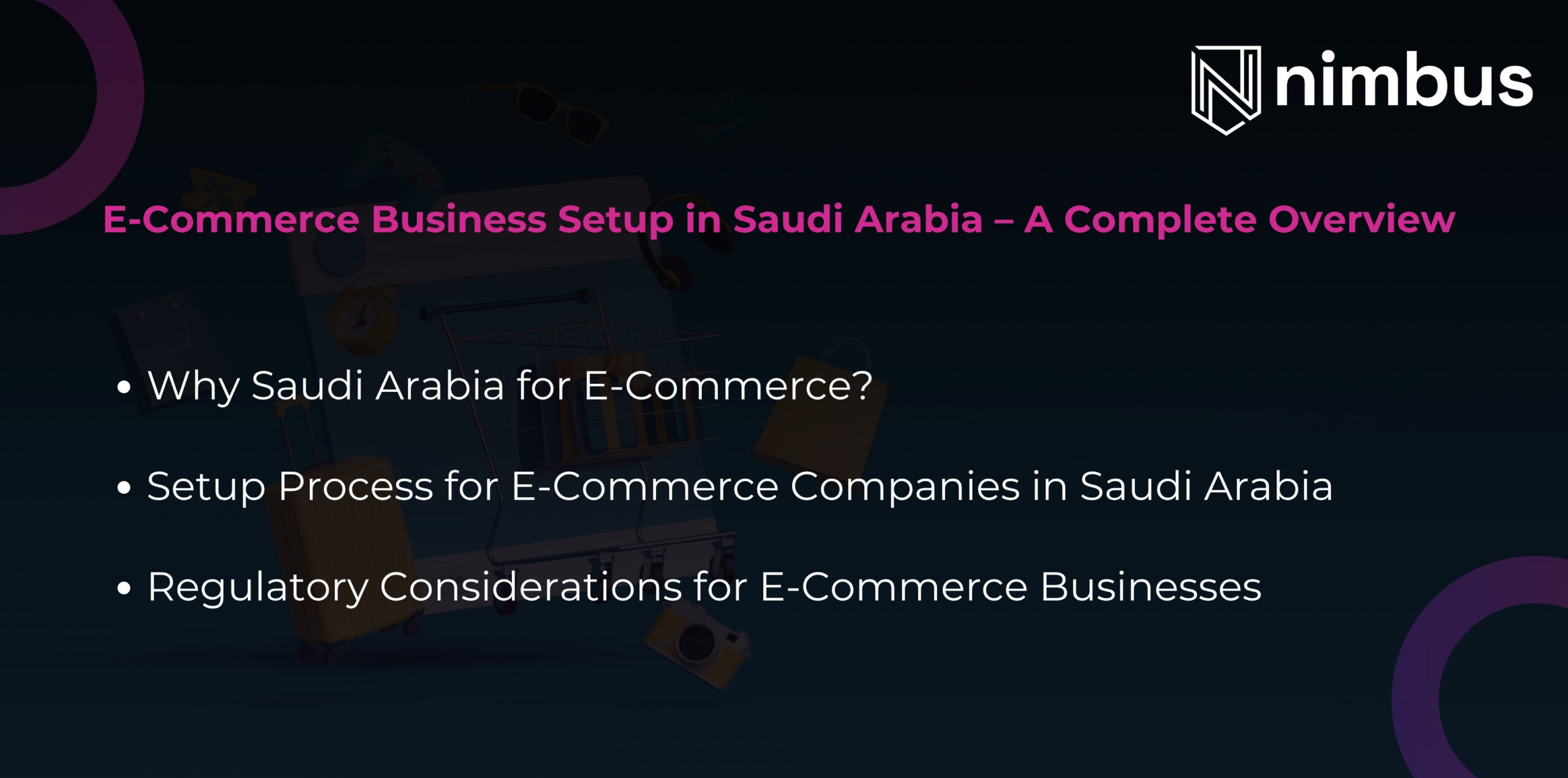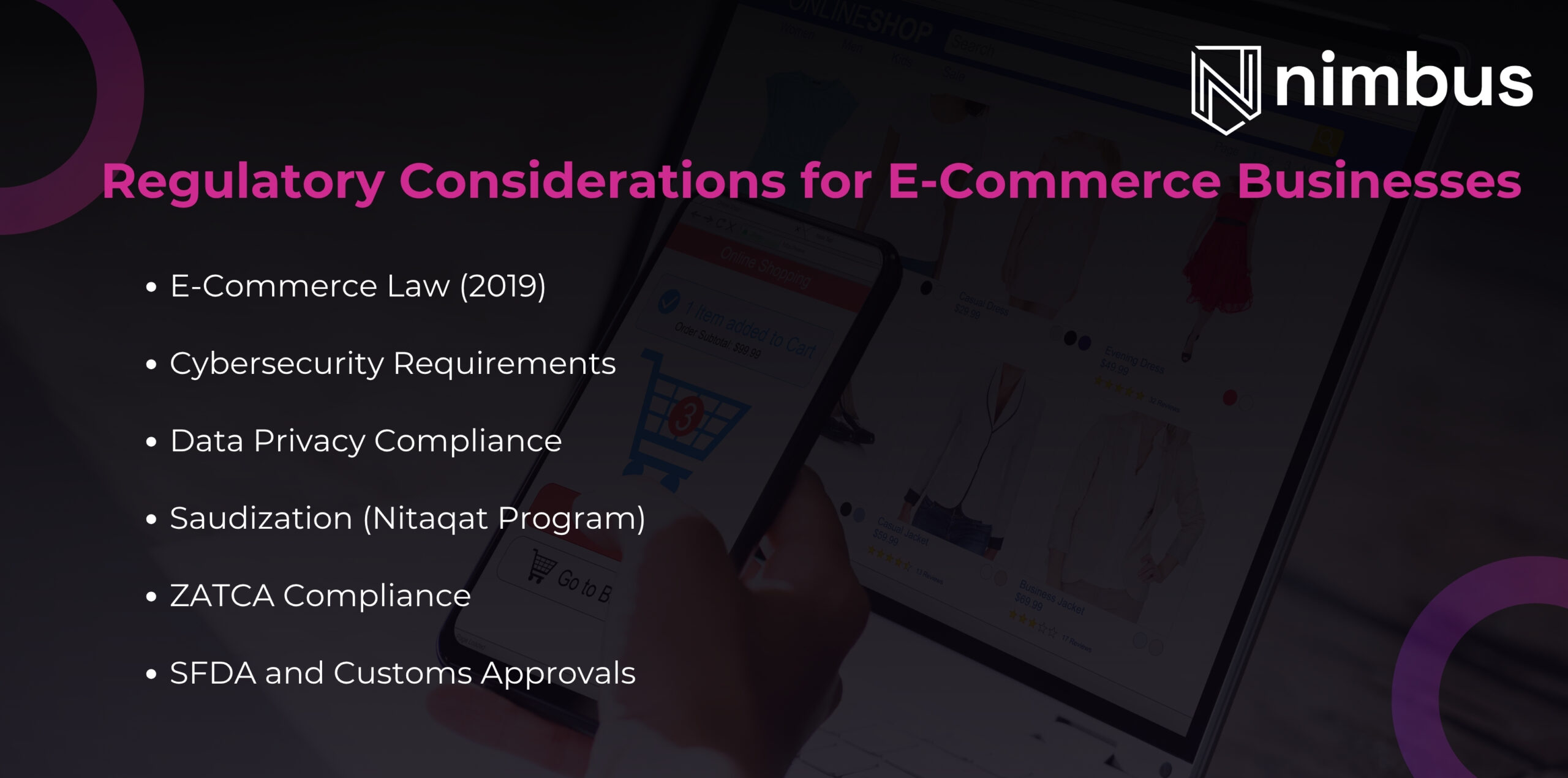Saudi Arabia has emerged as a leading digital commerce destination in the Middle East. With over 85% internet penetration, the Kingdom offers an unmatched opportunity for e-commerce businesses looking to expand into the Gulf.
The sector’s strong growth is driven by improved digital infrastructure, rising consumer demand, and significant government support under Vision 2030.
If you’re an international business or a startup planning business setup in the KSA, this post offers a detailed breakdown of what it takes to establish and legally operate an e-commerce company in Saudi Arabia in 2025.
E-Commerce Business Setup in Saudi Arabia – A Complete Overview

– Why Saudi Arabia for E-Commerce?
Saudi Arabia’s e-commerce market is growing at a CAGR of 12.10% and is projected to reach USD 68.94 billion by 2033. In 2024 alone, e-payments accounted for 79% of retail transactions, up from 70% the previous year. These numbers reflect a market that is not only growing but maturing rapidly.
Several global giants such as Amazon and Alibaba already dominate large shares of the Saudi market. Their success stories highlight the readiness of the ecosystem for new players and the relatively smooth entry process, especially when businesses work with reliable advisory firms in Saudi Arabia.
– Setup Process for E-Commerce Companies in Saudi Arabia
Setting up an e-commerce business in Saudi Arabia is a multi-phase process that includes legal registration, workforce setup, compliance, and residency formalities. Here’s how it works:
Phase 1: Legal Formalities
- Secure a MISA License
Foreign investors must apply for a license from the Ministry of Investment of Saudi Arabia (MISA) to operate legally in the Kingdom. - Reserve a Company Name
The proposed business name must be registered and approved by the Ministry of Commerce. - Draft and Notarize Articles of Association (AoA)
The company’s governance structure and operational terms must be clearly documented. - Obtain Commercial Registration (CR)
CR from the Ministry of Commerce serves as the official business identity. - Register with the Chamber of Commerce (CoC)
Membership is mandatory for all operational businesses.
Phase 2: Authorization and Incorporation
- Obtain Company Seal
A physical seal is required for official documents and regulatory submissions. - Register with the Ministry of Labor
Enables the company to sponsor and hire employees. - Register with the General Organization for Social Insurance (GOSI)
All local employees must be registered with GOSI for social security coverage. - Register a National Address
This is essential for regulatory and operational correspondence. - Secure a General Manager (GM) Visa
The GM must hold a valid work visa before assuming operations. - Register with ZATCA and Complete VAT Requirements
Businesses must register for VAT and ensure ongoing tax compliance.
Stage 3: Post-incorporation Steps
- Activate CoC Account
This is used for communication with the Chamber of Commerce. - Facilitate Health Insurance for the General Manager
Mandatory for Iqama (residency permit) issuance. - Conduct Medical Checkup
Required for residency application. - Obtain Iqama (Residence Permit)
This permit allows the GM to live and work in the Kingdom. - Register with Muqeem Portal
Used to manage resident employees’ status. - Register with Absher Portal
Government e-services platform for residents. - Register with Qiwa Portal
Used for labor market compliance and Saudization monitoring. - Register with Mudad Portal
For payroll and labor-related regulatory compliance. - Open a Bank Account
Final step to start financial operations and receive payments.
Foreign investors are strongly encouraged to partner with firms offering business setup services in Saudi Arabia to ensure all steps are followed accurately and in the proper sequence.
– Regulatory Considerations for E-Commerce Businesses

Operating in the Saudi e-commerce space requires compliance with a framework of digital, commercial, and consumer protection laws. Here are some essentials.
- E-Commerce Law (2019)
Governs online transactions and ensures transparency in product information, return policies, and dispute mechanisms. It also sets standards for data protection and consumer rights. - Cybersecurity Requirements
Businesses must protect customer data and secure payment gateways to avoid data breaches. The Anti-Cyber Crime Law provides strict penalties for non-compliance. - Data Privacy Compliance
All e-commerce businesses must implement data protection policies in line with local data security laws. - Saudization (Nitaqat Program)
E-commerce businesses must meet minimum quotas for employing Saudi nationals, especially in logistics and customer service roles. - ZATCA Compliance
Includes VAT registration, invoice standards, and timely tax filing. Businesses must also align with customs clearance regulations for imported goods. - SFDA and Customs Approvals
Products like food, cosmetics, and medical goods must comply with Saudi Food and Drug Authority (SFDA) regulations.
Advisory firms in Saudi Arabia specializing in compliance can help ensure that your e-commerce platform adheres to these regulations from day one.
Global Growth with eCommerce Business Setup in the KSA
Setting up an e-commerce company in Saudi Arabia involves a structured, multi-stage process that balances regulatory precision with tremendous growth potential.
By following the legal steps, understanding compliance obligations, and aligning with the Kingdom’s Vision 2030 goals, foreign businesses can confidently launch and expand their online operations.
Foreign investors should consider working closely with experienced advisory firms in Saudi Arabia to navigate the setup process, fulfill licensing and compliance requirements, and align with local market expectations.


